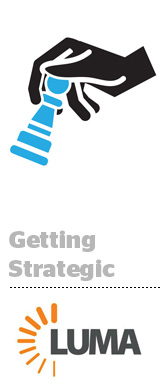
If you’re a mature marketing technology platform: Congrats. 2018 was your year and the future looks bright. But if you’re an ad tech company without a unique value prop that’s jonesing for an exit, apologies, the outlook remains fairly bleak.
Although digital advertising is still growing – it’s a $100 billion market today – Google and Facebook continue to suck most of the air out of the room, and the number of scaled exit opportunities for companies in the digital ad space are limited, according to a Q4 market report from investment bank LUMA Partners released Monday.
“There’s blood in the water for ad tech,” said Conor McKenna, a VP at LUMA. “A lot of the scaled companies in ad tech are undifferentiated, and there have also been a lot of false positives where an ad tech company will have scale for a certain amount of time, but that scale – and the value – can go away extremely quickly, like we saw with Rocket Fuel.”
Not to mention the amount of outstanding funding in ad tech and how old it is, McKenna said.
“Twenty-five percent of the funding in ad tech that hasn’t exited, either by IPO or acquisition, is over seven years old – and that means you have a lot of investors that were hoping to get out by now,” he said.
Ad tech companies that want to make themselves more attractive to potential acquirers or the public market need to demonstrate sustainability and get to profitability, which means cutting costs and carving out a very specific niche.
In other words, take a page out of Rubicon’s book, McKenna said.
“Rubicon did something very challenging, especially on the public market, by focusing solely on the supply side and cutting out buy-side fees, which dropped their take rate,” he said. “But in doing that, they aligned themselves with customers, they focused on their core competency and they were able to get back to growth, albeit from a low base.”
But for mar tech companies, it’s been boom time – there were six mar tech deals over $1 billion last year compared with zero in 2017 – and that’s mainly been driven by two interrelated factors, McKenna said: the maturity of the sector and the emergence of private equity firms as strategic acquirers.
Historically speaking, private equity looks for companies with high EBITDA and good financial outcomes before they invest. But PE is increasingly open to buying assets where they see strategic opportunities, either the potential for a large IPO or another sale down the road.
The best recent example of this trend is what Vista Equity Partners did with Marketo. Vista bought Marketo in 2016 for $1.8 billion, streamlined costs, held onto the platform for a couple of years and then sold it to Adobe in September 2018 for $4.8 billion.
“PE is getting more aggressive in part because of the nature of SaaS and the types of contracts and operating leverage you can get there,” McKenna said. “Private equity can see a clear path to high cash flows even without seeing a historical trend, and that’s leading to an increase in large-scale M&A for mar tech companies.”
But there was one scaled ad tech exit in 2018.
After years of will-it/won’t-it speculation about an IPO, AppNexus was acquired for a reported $1.6 billion in June by Xandr, AT&T’s new advertising and analytics unit. A sweet deal like that isn’t and won’t be the norm for ad tech, though.
“Xandr was out there looking for something specific and AppNexus was able to land the opportunity and they got themselves a great outcome – not to mention that the convergent TV space is a very exciting area,” McKenna said. “But what’s going to be tough is the generic display and ad tech infrastructure play … that’s becoming more of a scale game, and fewer and fewer players can claim to have it.”
This post was syndicated from Ad Exchanger.


More Stories
Citigroup Scales Back DEI Initiatives
Ticker: CBS News Tweaks Format of CBS Evening News
Wednesday, Feb. 19 Evening Cable News Ratings: Jesse Watters Primetime Wins in Adults 25-54